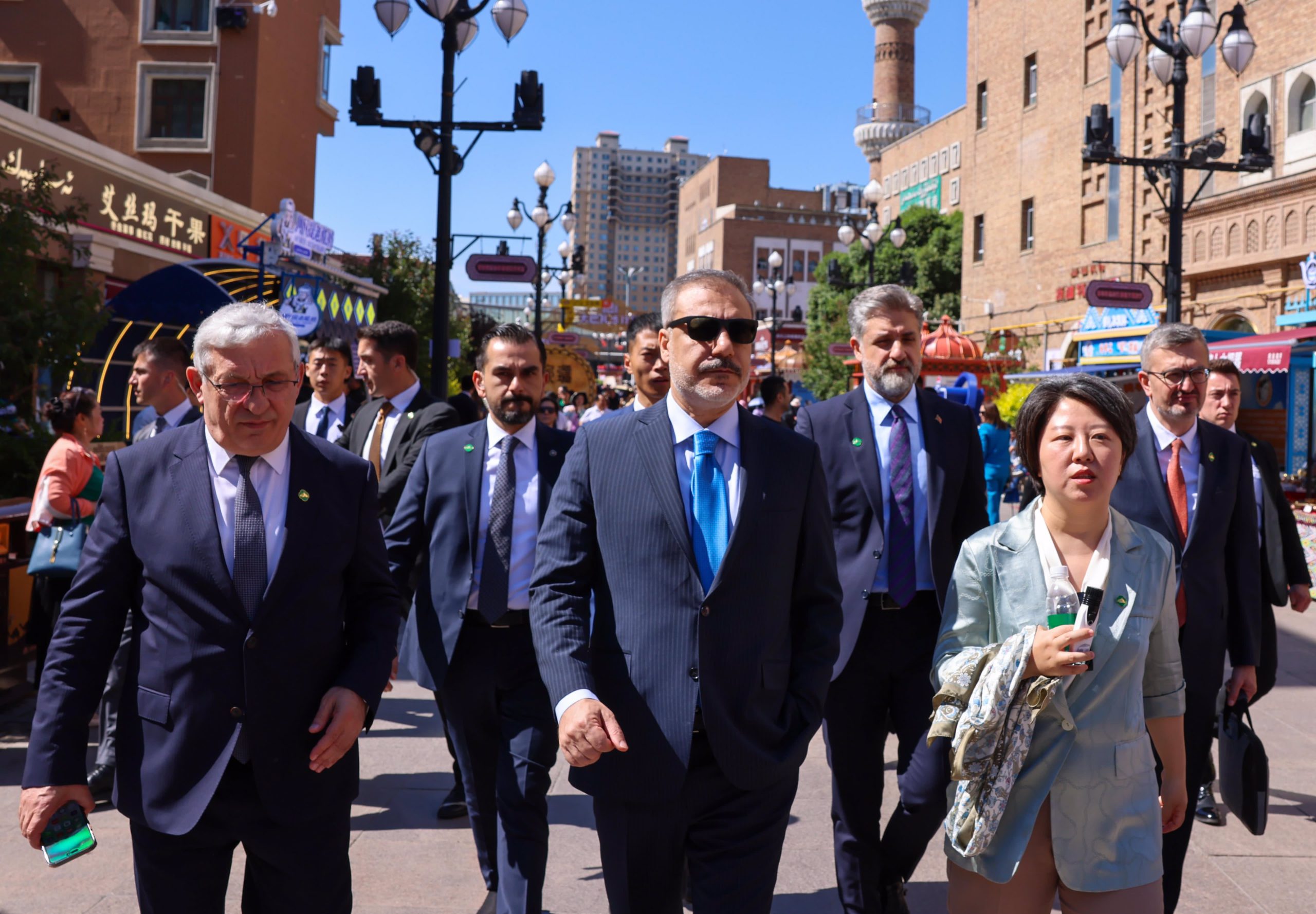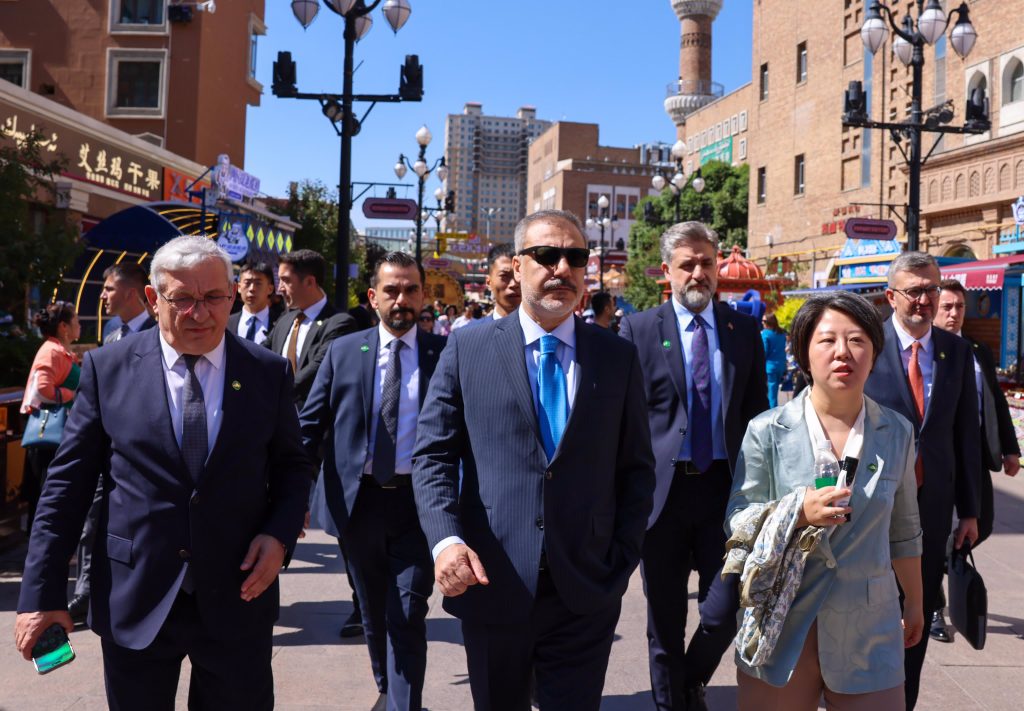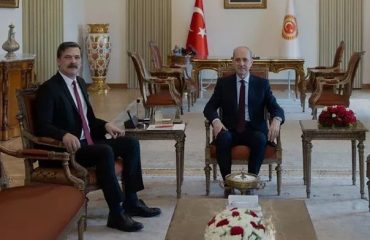

What put Foreign Minister Hakan Fidan’s trip to China on the world agenda was neither Türkiye’s desire to attract investment and economic cooperation from China nor the fact that he was the highest-ranking Turkish official to visit Uyghur Turks in China’s Xinjiang province after 12 years.
What put Foreign Minister Hakan Fidan’s trip to China on the global agenda was neither Türkiye’s desire to attract investment and economic cooperation from China nor the fact that he was the highest-ranking Turkish official to visit Uyghur Turks in China’s Xinjiang province after 12 years. It was the BRICS issue, sparked by a report in the Chinese press on June 4, which was immediately welcomed in Russia.
On June 3, the day he began his China trip, Fidan made a public speech at a conference titled “Turkey-China Relations in the Changing World Order” at the “China and Globalization Center” think tank in Beijing.
He stated:
“While we have a Customs Union with the EU, we are also exploring new cooperation opportunities with various partners in different platforms such as BRICS. In this respect, I look forward to attending the BRICS Meeting in Russia next week.”
There was no indication in his speech that Türkiye wanted to become a member of BRICS. He was talking about exploring “new cooperation opportunities” with BRICS, which stands for Brazil, Russia, India, China and the Republic of South Africa.
What about BRICS membership?
What he was “looking forward to” was the expanded BRICS meeting to be held on June 10-11 in Nizhny Novogrod, Russia, to which seven countries, including Türkiye, are invited in addition to the five member states. (*)
According to diplomatic sources, after Fidan made this speech, the meeting went into a closed session, which was supposed to be under “Chatham House” rules, which means the discussions should remain confidential. However, the cameras continued to record despite the Turkish delegation’s warnings.
During this part, Fidan was asked a question like “Would you like to join BRICS?”.
With the comfort of having just said what he was going to say, he gave a neutral answer, “If it is in Türkiye’s interests, why not?”
These words were reported in the Chinese press as “Ankara wants to become a BRICS member”.
A few hours later, Russian President Vladimir Putin’s spokesman Dmitry Peskov said, “We welcome Türkiye’s interest and will put it on the summit agenda.”
This situation resulted in a diplomatic stir, or rather a comedy, putting Fidan’s trip to China on the world stage.
Uyghur region is a sensitive issue
It is hard to say whether Fidan’s visit to China’s Xinjiang province, where Uighur Turks live, would attract as much attention as the BRICS discussion. But this does not diminish the importance of the visit.
The last time President Tayyip Erdoğan (when he was Prime Minister) visited the region was in 2012. This also marks the period when the Chinese Communist Party administration began to intensify the forced assimilation of Uyghur Turks, facing increased criticism for allegedly violating their religious and ethnic rights.
In Türkiye, where Xinjiang migrant Uighur Turks also live, the issue is a domestic political matter. It is a subject of competition between nationalist and Islamist parties and groups. China, on the other hand, approaches the issue from the perspective of sovereignty and territorial integrity.
In criticizing China, Türkiye has not toed the propaganda line of the US and Western European countries, but has instead taken its own line. Still, with Beijing’s black-and-white view of the issue, Türkiye is seen on the opposite side.
In a recent conversation with a Chinese diplomat, he gave two reasons for not investing more in Türkiye: firstly, Turkey’s Uighur policy, and secondly, that Türkiye’s constantly changing regulations destabilize the investment environment.
Urumqi, Kashgar and messages
The terrorist acts of Central Asian militants who have joined the ranks of al-Qaeda and ISIS since the Syrian civil war is another item. The concert raid in Moscow and the church raid in Istanbul are the latest examples of this. The fight against terrorism is an issue that Türkiye itself has suffered a lot and cannot remain indifferent to.
It is understood that Fidan, who left the BRICS discussion in Beijing, gave his messages by taking circumstances into an account while making observations on the spot, meeting with the authorities in both Urumqi, the capital of the Xinjiang Autonomous Region, and Kashgar, as well as visiting mosques, bazaars and markets.
It can be summarized as follows:
“We respect China’s sovereignty and territorial integrity. At the same time, Uighur Turks, with whom we have ethnic, religious and cultural ties, are very important to us. In fact, Uyghur Turks are a bridge between China and the Turkic world and between China and the Islamic world.
“Protecting the cultural rights of Uyghur Turks and living their values (…) will be of great benefit to everyone. Changing the perception on this issue will only be possible with the steps China will take.”
Let’s see what will be discussed at the BRICS meeting in Russia, apart from the Gaza Crisis, I should add.
NOTE
(*) Invited countries, other than the five members (Brazil, Russia, India, China and the Republic of South Africa), to the BRICS+ meeting in Russia on June 10-11: Türkiye, Kazakhstan, Algeria, Nigeria, Thailand, Vietnam, Vietnam, Cuba and Bahrain.


